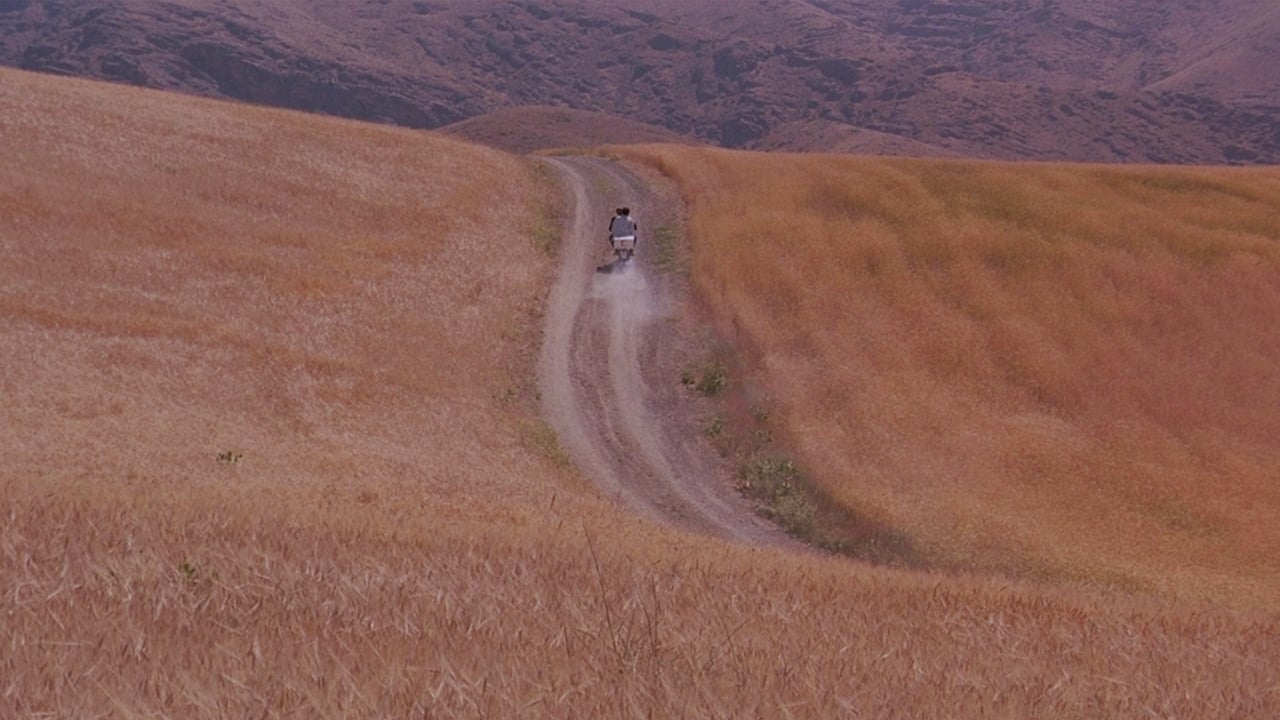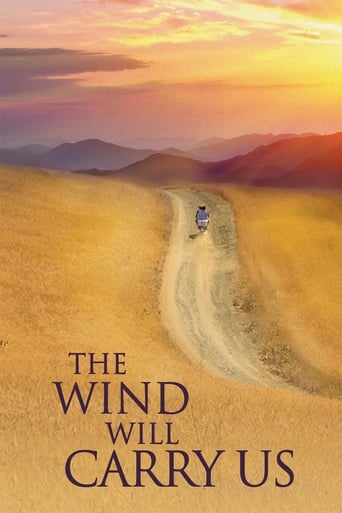

The Wind Will Carry Us is slow-paced and meandering, and this is initially infuriating for a viewer. It is the same sort of cultural shock that hits the 'Engineer' upon arriving at the modest, quiet villages etched into the side of the mountain. Kiarostami takes time to point his camera at trivial instances - an apple falling down pipes, a bone floating down the river. The dialogue goes everywhere but ends up nowhere nearer to Behzad's goal: to film the macabre mourning ceremony that will occur once a 100 year old woman passes away. But it does not happen at once, and they are forced to wait. They are impatient - all but Behzad never even show their faces, nor does his supervisor on the phone. They are a symbolic absence that hints at their inability to re-orientate themselves within this small community. The comical recurring gag is that every time Behzad gets a call he must drive all the way up to the highest hill, ironically near a cemetery, just to again be chastised by his boss and have little explanation except to plead for a few more days. It is in fact his hurried nature that clashes with the village and its inhabitants. The opening scene is a marvel - Kiarostami captures the 4 journalists in gorgeous overhead wide shots that emphasise the physical beauty of the surroundings, the rolling golden hills, the winding pathway, the pristine green pastures. And then he subverts this experience by placing our ears right into the car - they bicker and bicker for 5 minutes, arguing whether they are going the right way and if their directions were correct, completely oblivious to the nature around them. Even when the car breaks down and they are forced to confront the physical setting, the dialogue continues right into our ears as if we were walking alongside Behzad, constantly querying about his objective. This technique mars our experience too, because the pervasive squabbling and questioning is at odds with the distance and beauty that the camera presents. Elsewhere Kiarostami wields his camera with a curious omniscience, ever at conflict with the keenly busy engineer. In one instance, having received bad news from his boss, he angrily kicks out at a turtle, knocking it on its back. And then as he drives away, we remain focused on the writhing creature. In most movies this would be solely to emphasise the cruelty he has inflicted, and perhaps hammer home the message of his disregard for the wilderness and nature. But lo and behold, the turtle pops back up again, with Behzad long gone. Nature is not so easily swayed, not at least by the urban touch of these visitors. Much like the turtle, the village elder also refuses to die at his command. The group are so obviously out of their depth, but do not ever seem to consider and recognise it. A evocative poem's power is neutered by a culture clash - to be able to conjure up such stirring imagery, but rush past golden fields swaying in the wind on foot, bike and car. He is scolded as he tries to discreetly capture a candid argument between two elderly villagers on the labours of life and love - this must be experienced in person. And as he has his daily shave, he looks towards the camera which doubles as a mirror, and the observer, who sees so little with his filtered perspective, becomes the observed.
... View MoreAnother user who reviewed the film speaks of a film so full of 'symbolism' that he couldn't grasp. Maybe because it wasn't there? I'm generally not a fan of minimalism but Kiarostami grips me like no one else. I went out to take the trash after watching this and everything around me felt more alive, the nightsky, moon, trees blowing in the wind, I experienced all this in expansive vivid detail like new life was breathed into them. This is what a Kiarostami film does to me. It's about the sights and sounds of a life simple and profound in that simplicity, profound in the stoic sense of an old man sitting down in the same place every day to sip his tea. The wisdom here is not one of tremendous insight into something we didn't know, but a remembrance of something we knew and have forgotten and need to listen as the wind carries it back. Maybe the next world is beautiful muses a country doctor to our protagonist as they cross golden fields of wheat blowing in the wind, but no one has come back to tell us, so the present world is all we have; and how beautiful it is.Beautiful Persian Zen.The film is about waiting for something to happen, waiting for the death of an old woman which an engineer from Tehran and two of his associates have come to document; waiting for a narrative. Every now and then the engineer's cell phone rings, he has poor signal so he must rush to his car and drive to a nearby hill to get good signal. On top of the rocky hill there's a man digging a ditch, sight unseen, and the engineer idly chats with him down in his hole. That man digs up a thigh bone that once belonged to someone, the cemetery of the nearby village is on that hill, and throws it up to our curious protagonist. He stores it away in his car, a symbol of life come and gone. In the end he throws it down a creek and we see the old fickle bone flow down the water. All the symbolism in the film speaks for itself. Trees lush green and fields yellow golden with wheat and a hot dusty wind blowing over this.I have great admiration for the way Kiarostami makes films. He's so open to the filmmaking process, no strings attached, script, rehearsal, staging, all the mechanics subordinate to the real deal. It takes balls to go into this with as little safeguards. A lot of the film seems to have been improvised on the spot, in that small Iranian village, the faces are real, their casual chitchat the casual chitchat of real people. Take him or leave him, not a lot of people can make films the way he does and make them good.
... View MoreThe film was instantly hailed as a classic and completely firmed director Abbas Kiarostami's position as the single most acclaimed director amongst the art-house circles of the 1990s. Mysterious visitors arrive at a remote Kurdistani village and reveal enormous interest in an old dying woman.Intriguing and ambiguous, this film mixes witty and absurdist comedy with an unexpected thriller element, while contrasting traditional rural life with urban modernity. The answers to the questions it poses reveal themselves gradually, and seem to lie in the very landscape. The Wind Will Carry Us is a film of poetic depth that alludes to questions of life and mortality almost by stealth.
... View MoreWhat is most striking about this movie is the ethereal photography that effortlessly that transports the viewer into a harshly beautiful locale, affording a fascinating glimpse into the lives of folks in a village in a timeless and desolate corner of Iran. That is the positive.The negative is overwhelmingly the irritating and emotionless main character. Less of an annoyance, but nevertheless a negative, is the lack of any consistent symbolism, meaningful psychological representation or even a satisfying denouement.The leading character did not appear to be optimally cast. His character portrayal was completely underwhelming, and I found myself becoming increasingly weary of hearing his whiny voice go and on.That's another thing about this movie (and "Ten", also by the same director) - endless prattle. The opening shots of this movie are simply spectacular - very unique scenery that I was content to watch unfold, never mind the story. But then the "Engineer" and his pal start their yak and it kills the mood. They just talk for the sake of talking - no direction, no pauses, no point, just one over the other. I think this and other subsequent portions of this movie would have been more effective and dramatic by the use of silence. The entire movie lends itself very strongly and naturally to silence, rather than incessant, pointless and distracting conversation.The kid in the movie is good, but once again - the lines he is forced to deliver are sometimes so unnatural and garish as to make the viewer wince. No kid that age would speak like that! (Same comment for "Ten").All in all - a mixed bag. Nothing very symbolic or enigmatic here that is worth the watching. But if you watch it with lowered expectations, you will vastly enjoy a glimpse into an another world - an insulated world of community, rustic reality, open spaces and open hearts. And that is definitely worth something.
... View More